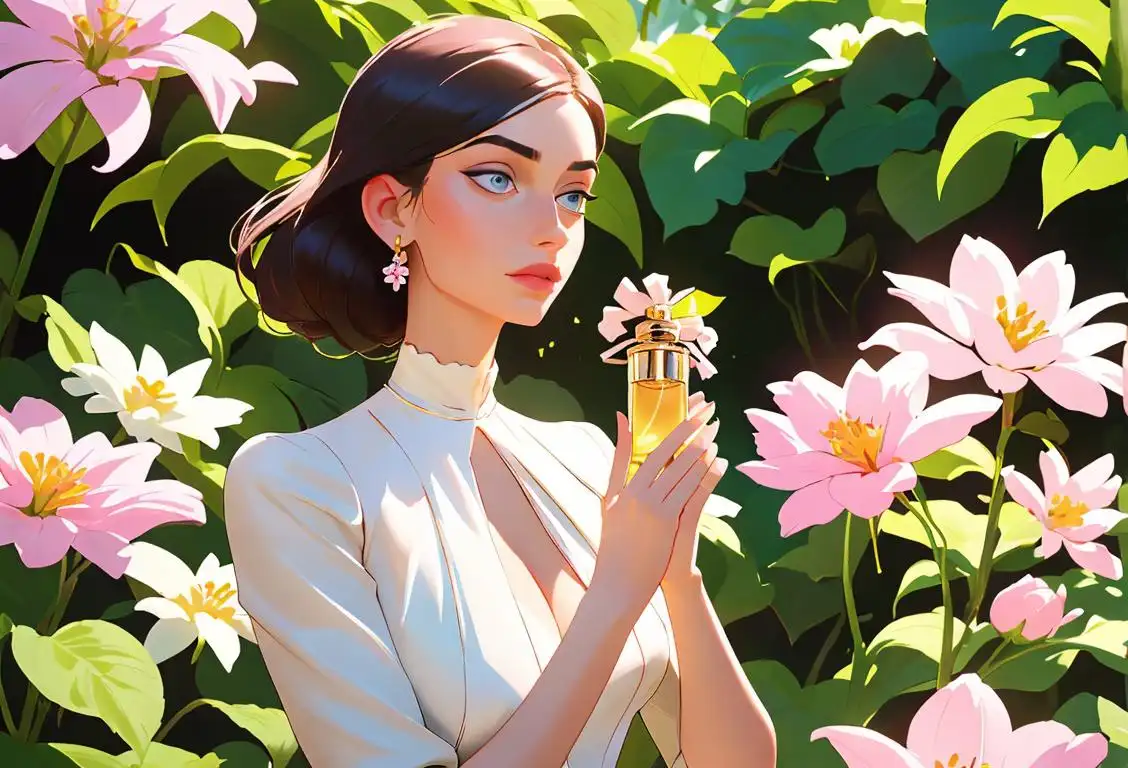National Perfume Day

Welcome to National Perfume Day, a day dedicated to celebrating all things fragrant and delightful! Whether you're a lover of classic scents, a connoisseur of niche perfumes, or someone who just likes to smell good, this is the day for you. So sit back, spritz a little something-something behind your ears, and let's dive into the fragrant world of perfume!
When is Perfume Day?
It's national perfume day on the 16th April.
The Scent-sational History of National Perfume Day
Did you know that scent has the power to evoke memories and emotions? It's true! That's why perfume has been an essential part of human culture for centuries. From ancient Egypt to the modern-day, people have been using fragrances to enhance their personal style and leave a lasting impression. And on National Perfume Day, we celebrate this magical blend of art and science.
The origins of National Perfume Day are a bit mysterious, much like the lingering fragrance of a captivating perfume. While we couldn't find a specific date for its inception, we do know that perfume enthusiasts from around the world have been honoring this day by sharing their love for scent on social media and hosting fragrance-themed events.
A Whiff of Fun: Did You Know?
Did you know that there are over 3,000 unique fragrance ingredients used in perfumery? From floral notes like rose and jasmine to exotic essences like oud and patchouli, perfumers have an endless palette of scents to create their masterpieces. So the next time you find yourself wondering how a perfumer comes up with such captivating fragrances, remember that their creativity knows no bounds!
History behind the term 'Perfume'
Ancient Mesopotamia
The Birth of Fragrance
In ancient Mesopotamia around 1200 BC, the first evidence of perfumery emerged. The people of Mesopotamia used various aromatic substances like myrrh, frankincense, and cedarwood to create pleasant fragrances. They would burn these substances as incense or mix them with oils to create scented ointments and perfumes. These early perfumes were mainly used for religious and ceremonial purposes.
Ancient Egypt
Perfumes as a Divine Offering
Perfumes took on a new significance in ancient Egypt around 3000 BC. They believed that fragrant scents were a gateway to the divine and used perfumes extensively in religious rituals. Egyptians developed advanced techniques to extract essential oils from flowers, plants, and resins, such as the lotus blossom and myrrh. Luxurious perfume bottles and containers became status symbols among the elite.
Ancient Greece
Perfume's Artistic Merit
Ancient Greece, around 600 BC, saw the rise of perfumes as an art form. Greeks introduced various aromatic extracts and created elaborate perfume formulas for both personal and ceremonial use. Legendary figures like Homer mentioned perfumes in their works, elevating their status. They believed perfumes had the power to evoke emotions and enhance beauty, leading to their association with glamour and luxury.
Middle Ages
The Alchemical Era
During the Middle Ages, from the 5th to the 15th century, perfume production became closely intertwined with alchemy and herbal medicine. Arab alchemists refined the distillation process, enabling the extraction of essential oils with greater precision. Perfumes were used for both religious and secular purposes, with the Catholic Church playing a significant role in perfume production and usage.
Renaissance
Perfumed Renaissance
In the 14th to 17th centuries, Europe experienced a great resurgence in perfumery during the Renaissance. The Italian city of Florence emerged as the center of perfume manufacturing, with talented perfumers producing exquisite scents for nobility. Perfumes were used to mask unpleasant odors and were considered essential for personal hygiene. The Renaissance era saw the development of innovative perfume techniques and the introduction of new ingredients like musk and ambergris.
Industrial Revolution
The Era of Synthetic Fragrances
The Industrial Revolution in the 18th and 19th centuries revolutionized perfumery. Synthetic fragrances were introduced, allowing for the mass production of scents. Chemical compounds such as coumarin and vanillin were synthesized, imitating natural scents and providing affordable alternatives. This era marked the democratization of perfumes, making them accessible to the masses.
Modern Era
Perfume as a Form of Self-Expression
In the modern era, perfumes have become an integral part of our daily lives and a form of self-expression. Fragrances are crafted using a wide range of natural and synthetic ingredients, and each perfume tells a unique olfactory story. With the rise of designer perfumes and niche fragrance houses, perfume enthusiasts can explore a vast array of scents and find the perfect fragrance to suit their personality and mood.
Did you know?
Did you know that there are over 3,000 unique fragrance ingredients used in perfumery?Tagged
romance nsfw funFirst identified
16th April 2015Most mentioned on
16th April 2015Total mentions
311Other days
Aldub Day
Weatherpersons Day
Love Pizza Day
Kisses Day
Awareness Day
One Day
Children Day
Happiness Day
Opposite Day
Ojd Day









